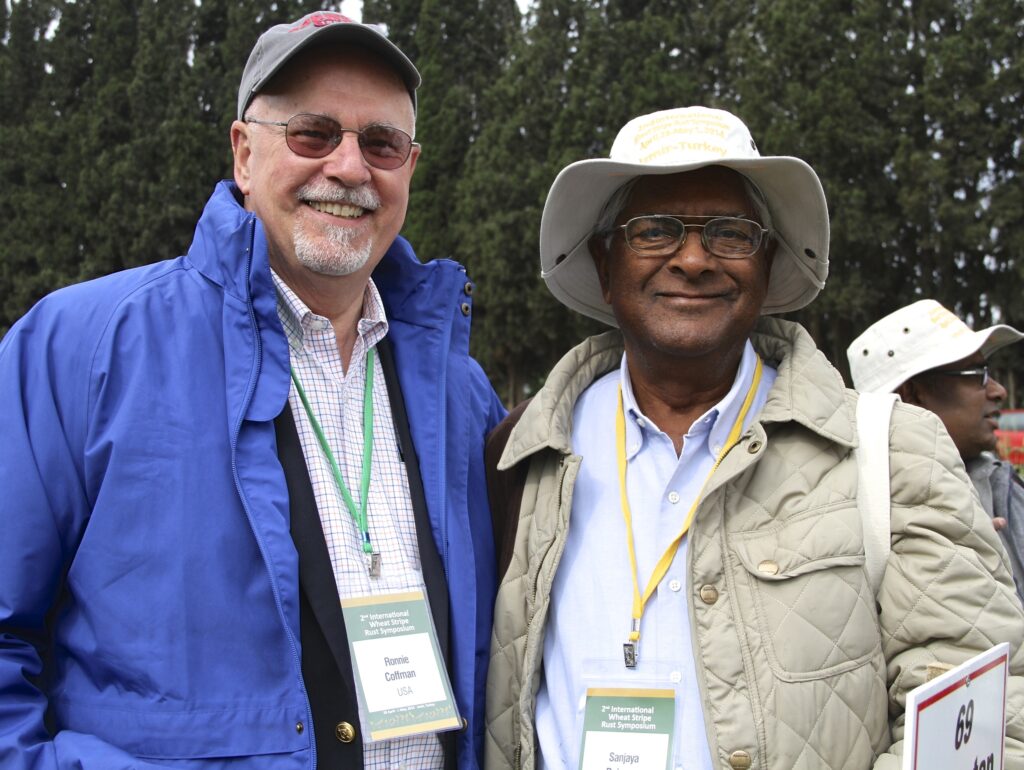February 19, 2021
Sanjaya Rajaram, one of the most influential wheat breeders in history and winner of the 2014 World Food Prize, died Feb. 17 in Mexico at the age of 78.
Rajaram oversaw the development of more than 480 high-yielding, disease-resistant wheat varieties. Known as “Raj”, he served as a bread wheat breeder and director of CIMMYT’s Global Wheat Program and later as a director at the International Center for Agricultural Research in the Dry Areas (ICARDA).
Wheat cultivars bred by Rajaram increased yield potentials by 20 to 25 percent and impacted the lives of hundreds of millions of people. His varieties were sown on more than 58 million hectares in 51 countries, from varieties bred for the acidic soils of Brazil to the mountains of Asia.
 Coffman and Rajaram together in Izmir, Turkey in 2014. Raj and Ronnie were friends and colleagues for 50 years. Credit: Linda McCandless
Coffman and Rajaram together in Izmir, Turkey in 2014. Raj and Ronnie were friends and colleagues for 50 years. Credit: Linda McCandless
“Few scientists in history can match Sanjaya Rajaram for his impact on people’s lives,” said Ronnie Coffman, vice chair of the Borlaug Global Rust Initiative and international professor in Cornell’s Department of Global Development. “Raj’s work fed the world, especially the developing world, where the wheat varieties he bred provided sustenance and hope for countless hundreds of millions of people. He was a true titan of plant breeding.”
Coffman and Rajaram worked together as young scientists in the 1960s under the tutelage of Norman Borlaug. It was just over 50 years ago at CIMMYT’s Toluca Station when Borlaug — while working in the fields with Coffman and Rajaram — learned that he had received the Nobel Peace Prize.
“The world lost an agricultural giant late last night,” said Barbara L. Stinson, President of the World Food Prize Foundation. “In succeeding Dr. Norman Borlaug, in heading CIMMYT’s wheat breeding program, Dr. Rajaram developed more novel and improved wheat varieties than even Norm did – over 480 disease resistant high-yielding varieties grown in over 50 countries. His memory will live on forever through the millions of lives he impacted around the world.”
Rajaram’s efforts increased global wheat production by more than 200 million tons during his lifetime in diverse regions across the globe, according to CIMMYT.
Martin Kropff, CIMMYT Director General, praised Rajaram as a scientist who treated all people the same.
“At CIMMYT, we all remember Raj as a great and humble colleague helping the team to perform at the highest levels of science with impact. Many of us within CIMMYT, as well in national programs worldwide, have been inspired by him,” Kropff said.
Rajaram trained and mentored more than 700 scientists from developing countries worldwide.
“Dr. Rajaram built a generation of wheat breeders at CIMMYT, ICARDA and national research institutions, who are carrying on his legacy and ensuring that new wheat varieties continue to reach farmers,” said Ravi Singh, head of the Wheat Improvement program at CIMMYT once led by Rajaram. “We will deeply miss his presence and encouragement.”
In the early 2000s Rajaram joined ICARDA as director of the Integrated Gene Management Program. Even after his retirement in 2008, he continued to provide wheat improvement strategies related to production in dry areas, including stripe rust.
“Dr. Rajaram contributed so much to ICARDA’s work in Syria and Morocco and our wheat and barley programs,” said Aly Abousabaa, director general of ICARDA. “He has improved the lives of thousands of farmers in dry regions where ICARDA works across Africa, the Middle East, and Central Asia, and his unique contribution to science has formed the basis of improved crops worldwide.”
Sanjaya Rajaram was ‘a scientist of great vision’
Rajaram was born in 1943 on a five-acre farm in Uttar Pradesh in northeastern India. A brilliant student, he studied genetics and plant breeding at the Indian Agricultural Research Institute in New Delhi before earning his Ph.D. from the University of Sydney. In 1969 he left for Mexico to work at CIMMYT alongside Norman Borlaug. The Nobel Prize Laureate described Rajaram as “a scientist of great vision who made a significant contribution to the improvement of world wheat production, working for the benefit of hundreds of thousands of farmers in countries across the globe.” Borlaug named Rajaram as head of CIMMYT’s wheat breeding program at the age of 29.
His crossing of spring and winter wheat varieties led to new advances in wheat varieties that were stable across a wide range of environments, according to CIMMYT. His varieties featured high yields and resistance to wheat diseases like rust and foliar blight, and were sown on 58 million hectares in 51 countries.
In 2014 he was awarded the World Food Prize for impacting the lives of hundreds of millions of people through wheat breeding.